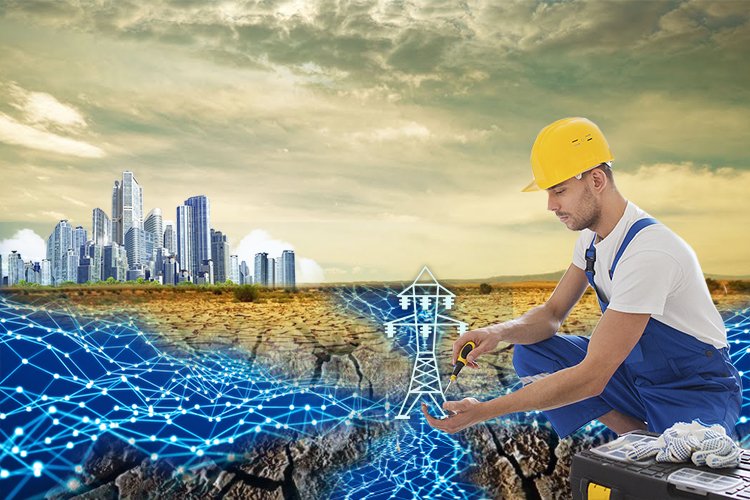How To Earn $400 Million on DLT in Energy Industry

Energy is one of the central issues of the modern world. Industry development, a standard of living, daily lives of the communities and their future perspectives - all those things are bound to the question of electricity or lack of it. And blockchain is playing a pivotal role in guiding this precious resource to the people that desperately need it for the further development and overall life improvement.
During the international summit Blockchain Seoul 2018 Bitnewstoday.com had a pleasure of talking with Dan BATES, an entrepreneur working on creating the brighter future for those who in need. And that's not just another “charity” program that is peddling horrendously outdated laptops for “developing computer literacy” or cheap radios with a built-in dynamo, mooching for grant money. That is a real business that works and makes people's lives better, by selling them a solution to their problems:
“We are selling, managing and controlling electricity. I think that’s our full description. We are powering homes in a manner that is affordable and handy to every person and if skip details - that's pretty much all that is needed for making fruits of the progress available.”
They are hardly unique, we have already written a number of articles on the topic of blockchain in the energy industry. But this is the case when it is a bit different. Most of the resemble companies control only a part of the process, like buying and selling or transportation and registering. And this project is particularly interesting because they claim that they are doing everything, from the process of generation to the very end when users pay for the power.
“We are offering people a way that allows them to pre-pay for the power as they do for the cell phone minutes. This is a very important feature for places like East Africa since up to 70% of transactions in the country passes through the M-Pesa mobile operator system that allows using your minutes to pay for the goods and services. Our service is fairly easy - first, our end user needs to install the smart-meter and get connected to the microgrid. Then, they pay up for the transfer of the money, and that's pretty much it - you got yourself a smart contract for energy.”
This system is not particularly new for the industry - for example, it’s relatively close to LO3, one of the companies that were pioneers in the field. Their system is similar, but it’s not the same - they have something that is more like an energy-credit system.
Mister BATES explained that it is not that easy, for example - after Matthew's rampage through Haiti, many cities lost power for years because the hurricane decimated them. So at first - they had to rebuild infrastructure. “A lot of people are talking about the p2p energy industry, but the truth is - you need good old copper wires to transport electricity, people need to be physically connected to the microgrid, this does not work in some other way, that's physics for you. You need wires to be able to flip the switch and light up your house”.
At Haiti, his project works alongside with Caribbean Climate-Smart Accelerator, company that was launched by a Richard BRANSON, entrepreneur and VC investor that is famous for this positive views on the crypto economy and charity work.
“But we are not concentrating on Africa alone. We are working alongside the Indian government in a project that is aimed to support local artisans, making traditional fine cotton fabric. Government is handing out spinning looms, and we are powering them. This way, around 50 million women will be lifted out of the poverty since they will get a considerable boost for their income - around 10 thousand rupees each month”.
We should add that India has very uneasy relations with the crypto verse in general. Starting from the 2nd of July, this year, their supreme court became a field of the constant legal battle for the future of the crypto industry in the country. Even though a lot of experts say that efforts to fully ban crypto will only do worse and drive the market into the shadows - there are rumors that Indian government considers following the Chinese scenario “Blockchain, but not bitcoin.”
But overall - this doesn’t mean that Mister BATES project exists only on the grants or government support. Governmental funding does not play a pivotal role in their case, how it’s often happening with the companies involved in the charity work.
«We are doing this for ten years, and it’s a profitable business. And to be all honest - I am not even concerned with the state of the blockchain we are using. Right now - ERC20 and Ethereum is a handy and usable tool for us, but we couldn’t care less if we had to switch to EOS or Stellar. IF there are folks that can be called blockchain evangelists, then well, we are pretty much blockchain agnostics.»
It is expected that the technical solution will enter the market by the end of the year. According to Mr. Bates, it is difficult to work in developing countries. But these markets are promising. “If you want it - you can find an approach towards everyone, really, our work at Haiti is a living proof of that. We’ve begun talking with the local government and utility supplier that has a monopoly on the market. We came to them with an offering, asking for their help and support. The result of this - $400 million in profits in our direct sight. Not too many people in the industry can boast with such a number, eh”, - concluded mister BATES